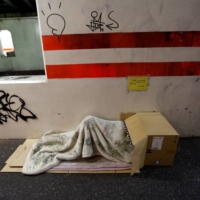Sleeping on the street is already tough. But last year, when the government’s emergency ¥100,000 handout for all residents failed to reach most homeless people, one such man in his 70s, living in Tokyo, felt even more left out.
Now, a year later, that same resentment has been reignited as he experiences similar difficulties accessing the COVID-19 vaccine.
“With no certificate of residence or identification, I know I can’t get the vaccine even if I wanted to,” he said, as he was handed a portion of curry and rice at the Missionaries of Charity Brothers soup kitchen in Taito Ward on Tuesday morning.
The man, who asked not to be named, is among a portion of the population likely to be left behind by Japan’s vaccine rollout, despite having a day job and already dealing with a pre-existing medical condition.
Nearly a quarter of the nation’s 126 million residents have so far received at least one dose of a COVID-19 vaccine made by Pfizer Inc. or Moderna Inc.
Kazuo Takagi, a lay brother with the Roman Catholic congregation, says many who live on the streets have not been inoculated as vaccination coupons won’t be sent out for them, as they lack certificates of residence.
The Ministry of Health, Labor and Welfare asked local governments in late April to arrange vaccinations for the estimated 4,000 homeless people who live in parks and alongside rivers across Japan.
But the lack of a residence certificate or other identification presents a challenge for many local municipalities, which are responsible for sending out vaccine coupons.
Officials in Tokyo’s Taito and Shinjuku wards say they recognize the need to vaccinate people on the streets, and are considering measures for the vulnerable group.
International nongovernmental organization Doctors of the World Japan conducted a survey of 314 people who came to soup kitchen events in Tokyo in late May and found that 58% of them wanted to get vaccinations. But about 30% of them said they would not be able to receive vaccination coupons, and many of them said they had no identification at all.
Taking that into account, some support groups for the homeless are allowing them to use the groups’ office addresses as their registered address. The workaround allows them to receive the vaccination coupons and make reservations to be vaccinated, but many are reluctant to take that approach.
Homeless people, including those who live in internet cafes, are just one of the groups of people who would need to consult with local governments proactively to get a vaccine.
Pregnant women who have returned to their parents’ home to give birth, students living away from home and company employees who live apart from their families can consult their current municipalities of residence to get the shot.
Vaccinations have also been planned for nearly 2.9 million foreign residents in Japan, including foreign students and those enrolled in the Technical Intern Training Program. Vaccination coupons for these individuals will be issued at the same time as those for Japanese nationals, municipal government officials have said, although foreign visitors in Japan on a short-term basis are not eligible.
Hironori Kusuhara, a manager in Shinjuku Ward’s municipal government, says the ward has also received inquiries from families of bedridden people unable to go to a vaccination site, and that vaccinations on an individual basis can be arranged if it’s not possible for such people to be vaccinated by their visiting family doctors.
Last week, Foreign Minister Toshimitsu Motegi announced the government would begin offering vaccinations free of charge to Japanese nationals living overseas who temporarily return from Aug. 1 onward, after receiving many requests for such arrangements.
A foreign ministry official said the ministry conducted a survey of about 450,000 Japanese nationals living in 169 countries, and that about 40,000 of them have expressed a wish to return home to be vaccinated.
A special online reservation site for Japanese nationals living overseas will be set up in mid- to late July. Vaccinations will be conducted at Tokyo’s Haneda Airport and Narita Airport in Chiba Prefecture until early January, with shots made by Pfizer Inc. to be allocated for people age 12 and above, the foreign ministry said.
In a time of both misinformation and too much information, quality journalism is more crucial than ever.
By subscribing, you can help us get the story right.
SUBSCRIBE NOW



